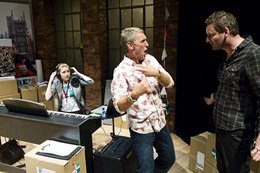“A poet is the conscience of a nation”: so rattles off Dessie O’Hare (Miche Doherty), the third rate poet that’s been hired to write Northern Ireland’s new national anthem. Forced together by Stormont authorities in a rush attempt to conceive an anthem in time for a diplomatic visitor, he and new-age muzak composer Gary Miller (Stuart Graham) must imagine a collaboration that acknowledges the region’s troubled past but heralds a brighter future. From Ballymena to Ballyhalbert, Bateman and Ransom Theatre Company take us on a somewhat stilted journey of self-discovery.
The melody is the easy part; putting words to the music proves more difficult. In a council-sponsored room, they set about defining the essence of Northern Ireland in neutral, inoffensive, tourist-pleasing terms: “you want to punch the air, but not so much that the other fella wants to rip your head off.” They have been handed a poisoned chalice: devising lyrics that will speak to the vision of both sides is surely a hopeless enterprise. It’s a commission to sell an idea, to manufacture a culture, to represent a nation that may not even exist. “We’re not a country. We’re an artificial creation,” says O’Hare.
 Stuart Marshall’s set, composed of tri-colours and union flags, promotional posters and tacky t-shirts, represents culture a la Belfast City Council. Cardboard cut-outs of the Giant’s Causeway and City Hall rest against the exposed brick walls.
Stuart Marshall’s set, composed of tri-colours and union flags, promotional posters and tacky t-shirts, represents culture a la Belfast City Council. Cardboard cut-outs of the Giant’s Causeway and City Hall rest against the exposed brick walls.
The characters, supervised by a human resources employee from the council (Niamh Quinn), seem somewhat ill-fitted to their task: O’Hare fled to Galway during the troubles and Miller moved to Switzerland after a showband massacre. Neither of them actually reside in the ‘new’ Belfast. Coming back after a decade, they bring dated attitudes and prejudices that do not reflect the progress made at home. Miche Doherty is terrifically convincing as the lily-livered O’Hare, exhibiting the anxious mumbling quality of a man afraid of his own reflection. He and Graham make a sound on-stage partnership, their one-on-one scenes anchoring the action.
Veda bread, cartons of suki, pastie dinners, paramilitaries and “lighters for a poun” – what constitutes a symbol of the ‘new’ Belfast? Navigating political landmines is near impossible. The subject matter soon creates tension between the two artists as the script ventures into realms of self-pity and defeatism. “George Best, Alex Higgins and Bobby Sands,” declares O’Hare, identifying national heroes. “Two drunks and an eating disorder,” responds Miller.
Joining a pantheon of novelists whose work does not translate smoothly to theatre, Colin Bateman’s fast paced, witty language makes an uneven transition to the stage. In aiming for the theatrical, he has slightly overshot, overexposing his characters. Their nature and history are revealed prematurely and dialogue occasionally veers towards contrivance – too willed, too self-conscious.
However, the plot does exhibit Bateman’s own brand of fearlessness: the true humour of his stage debut arises from bizarre comedic situations, primarily in the form of the new national mascot. Alan McKee completes many a comic turn as Blind Alan (Miller’s fictional brother) and then as Snooki, an armed badger complete with dissident republican ambitions. Finally exposed after an in-house bomb hoax, he will, in an absurd twist of fate, fall victim to his own gun and the fork-yielding human resources employee.
Director Rachel O’Riordan leads us on a wild adventure through the script as it contorts through various energetic plot turns. (Opening night featured a real life stab wound - inflicted by a fork - and a broken toe for actor Stuart Graham.) Every inch of the small stage features in this story of doubt, paranoia, and ultimately, unity.
Though Bateman may not have hit all the right notes, his first steps into the theatrical world are not without merit or mileage. His reflections on national identity, multiculturalism and hybridity are certainly thought provoking. Is it possible for these two men, each of who come with their own cultural and religious baggage, to put aside their differences for the sake of their country? Can Northern Ireland project a global image that encompasses alternative views?
Somewhat surprisingly, an anthem is delivered. Conor Mitchell’s rousing composition strikes a perfect balance of strength and nostalgia. The audience finds itself belting out the lyrics with unexpected patriotism and jubilation. Compromise was not democracy built on a swamp, as the badger predicted.
Kathy Clarke is an arts journalist based in Belfast.